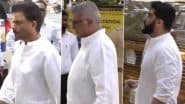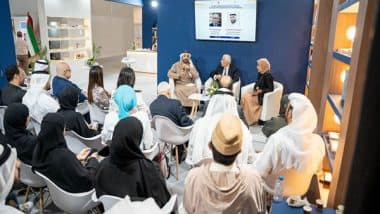Sharjah [UAE], May 3 (ANI/WAM): As part of its cultural and intellectual programme at the 34th edition of the Abu Dhabi International Book Fair, the Muslim Council of Elders hosted a seminar titled "The Role of Educational Institutions in Raising Awareness of the Importance of Intra-Islamic Dialogue.
The seminar featured Dr Khalifa Al-Dhaheri, Chancellor of Mohamed Bin Zayed University for Humanities, and Dr Tarek Shawki, former Minister of Education and Technical Education of the Arab Republic of Egypt.
In his opening remarks, Dr Al-Dhaheri emphasised that the humanities represent the intellectual foundation upon which nations and civilizations are built, as they encompass values, ethics, and profound meanings.
He noted that contemporary humanities encompass fields such as sociology, psychology, and philosophy, and are essential to civilizational development, underscoring the need for their active presence in today's cultural and intellectual discourse.
Dr Al-Dhaheri underscored that intra-Islamic dialogue constitutes a vital pillar for fostering understanding among various Islamic schools of thought.
He highlighted the importance of moving beyond historical conflicts that have claimed innocent lives in favor of a unifying discourse rooted in shared values.
"Values such as mercy and justice are common to all religions and schools of thought, and these values must be instilled in younger generations. The voice of peace must rise above all others, and we must continue the journey of values and dialogue without being swayed by voices of discord," he said.
He commended the efforts of the Muslim Council of Elders in promoting a culture of dialogue and human coexistence.
He stated that the Council has emerged as a global leader in dialogue, both between religions and within Islamic schools of thought.
"The Council played a pivotal role supporting the Document on Human Fraternity--one of the most important documents in the history of inter-religious dialogue--signed in Abu Dhabi in 2019, marking a major milestone in strengthening Christian-Muslim relations," he said.
For his part, Dr Tarek Shawki emphasised that developing educational curricula must begin with the early inculcation of values in childhood.
He pointed to the rapid changes of the modern era and the widening generational gap as one of the most significant challenges of our time.
"We cannot apply the curricula of the past to Generation Alpha," he explained, "and it is essential that teachers and parents embrace new educational approaches before expecting students to do so."
Dr Shawki called for a comprehensive review of the materials presented to children and for expanding initiatives that reinforce identity and language.
"Investing in human capital is the most important form of investment, and we need a conscious and responsible media to support these efforts," he stated. (ANI/WAM)
(This is an unedited and auto-generated story from Syndicated News feed, LatestLY Staff may not have modified or edited the content body)













 Quickly
Quickly














